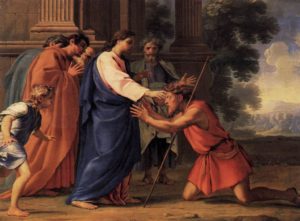Thoughts on Today’s Lessons for March 26, 2017

Christ Healing the Blind Man (c. 1640). Gioachino Assereto (1600–1649). Carnegie Museum of Art, Pittsburgh.
In the first three Sundays of Lent, our readings have turned our attention to temptation and sin, faith and trust, and thirst. Now we reflect on light and sight: What do we see, and how do we see it? In our first reading, we learn that God has rejected Saul as king of Israel, and will send Samuel, the prophet and judge, to take on the risky chore of finding Saul’s successor. Saul rejects the sons of Jesse the Bethlehemite, one after another, before reaching David, Jesse’s youngest son, who had seemed such an unlikely choice that he had been sent to watch the sheep while his older brothers met Samuel. But God saw the spirit in David that the others could not see. David becomes king and next in the Messiah’s line.
It is difficult for Christians to hear the comforting verses of the 23rd Psalm without envisioning Jesus as the Good Shepherd. After all, John’s Gospel tells us outright that Jesus said, “I am the good shepherd. The good shepherd lays down his life for the sheep.” Ancient tradition, though, holds that King David wrote these lines himself, speaking of a subject that he would have known well as a boyhood shepherd. In fact, it’s most likely that ancient rabbis in exile wrote the song, thinking of a future earthly Messiah who would restore Jerusalem and the Temple. No matter how we read it, we all can rest in the joy of knowing that God’s rod and staff comfort us, and God’s goodness and mercy follow us all the days of our lives.
Second Reading: Ephesians 5:8-14
The short letter to the church in Ephesus was probably actually written by a follower in Paul’s name a few decades after his death. Today’s reading offers a poetic view of light against darkness, a fitting metaphor to accompany today’s Gospel about the man born blind who learned to see what the Pharisees could not see.
Gospel: John 9:1-41
Speaking of harsh ideas that linger from ancient times, it is hard to overcome the false idea that blindness and other disabilities are God’s way of punishing our sins or even the sins of our ancestors. Standing strongly against this old belief, Jesus’ makes it quite clear that God does no such thing. In the long narrative that follows the intriguing details of Jesus healing through a mud mixture washed in a specific pool, we hear Jesus, the Pharisees and the no-longer-blind man make it clear that God works in the world through grace, not punishment, and that the miracle of healing cannot come from sin or evil. “We once were lost, but now are found … were blind, but now we see.”
